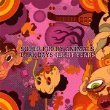
If anything I wrote about on this blog were ever likely to make me lose all sense of detachment, a new Super Furry Animals album would be it. After all, they are my favourite band — I don’t think any act recording today can match them in terms of breadth and consistency; and I’d recommend that anyone reading this who is not familiar with their music gets acquainted as soon as possible.
And there is a lot of music to get acquainted with. Dark Days/Light Years is SFA’s ninth studio album and, as usual, it’s very different from the last one. Their previous album, 2007’s Hey Venus!, was short, sharp, and concise; this, in contrast, is the longest yet — but it’s a wonderfuly expanisve hour of music. Each song is different, so the only way to do the album justice is to take it one track at a time…
1. ‘Crazy Naked Girls’
Every SFA album starts differently, and Dark Days/Light Years continues that tradition. Whereas the opening track of Hey Venus! was over in 45 seconds, ‘Crazy Naked Girls’ doesn’t even get underway until after almost a minute of studio chatter, and then continues for another five meandering minutes that I just cannot get into. Gruff Rhys sings the verses in an oddly breathless, high-pitched fashion that I don’t think really works, before guitarist Huw Bunford comes in for the chorus, and the whole thing goes on too long.
2. ‘Mt.’ [link to audio]
Grumbling over: the rest of the album is fine. With ‘Mt.’, keyboardist Cian Ciaran takes lead vocals on a fast song for the first time; he should do so more often, because this is fantastic. A song that might seem at first to be too restricitive and repetitive in structure for its own good turns out to have a real swinging groove and momentum.
3. ‘Moped Eyes’
Another song with a groove, though one of a rather different sort, ‘Moped Eyes’ gives the album its title (‘Dark days seem light years away’) and simmers along nicely for four minutes; and you may well find yourself, as I did, nodding along to the beat.
4. ‘Inaugural Trams’ [link to audio]
This is the kind of SFA song that, if you try to describe it, sounds ridiculous. Here goes… A song about town planning (chorus: ‘It’s the first day of the integrated transport hub’), that sounds like the theme to a cartoon, and has guest rapping by Nick McCarthy from Franz Ferdinand — in German. It shouldn’t work, but it does.
5. ‘Inconvenience’
A straight-ahead (for SFA) rock song that almost defies you not to sing along with the chorus. Which is exactly what I ended up doing.
6. ‘Cardiff in the Sun’ [link to audio]
Now this is an example of why I think Super Furry Animals are such an extraordinary band, because their music ranges so widely. SFA go almost ambient with chiming guitars, treated vocals, and trademark ‘sha-la-las’. It’s compelling for all its eight minutes, and sounds completely otherworldly.
7. ‘The Very Best of Neil Diamond’
Rather more serious than its title might suggest, this is another electronic song, though more aggressive tham the previous track. Gruff’s vocals are perhaps even more distorted, making them so distant the effect is almost hypnotic.
8. ‘Helium Hearts’
The closest thing on Dark Days/Light Years to a ballad, this song poses the question: with all these body parts that do such useful things, what is the chin for? The answer, we learn after three minutes, is that it helps you smile. Lovely stuff.
9. ‘White Socks/Flip Flops’
Apparently, the title refers to ‘the type of footwear one needs to write a good novel’ (never having tried to write one, I must reserve judgement on whether that is so). Vocals by Huw Bunford, and I think this is his best song to date; again, it has a nice ‘groove’ to it (can’t you tell I’m not very well-versed in describing music?).
10. ‘Where Do You Wanna Go?’
The shortest song on the album, at two-and-a-half minutes, and also the most straightforward. A great showcase for the Beach Boys-style harmonies that SFA do so well.
11. ‘Lliwiau Llachar’
Here’s a neat trick: this song uses the same melody as the previous one, only this time the lyrics are in Welsh. But it’s not the same song (the title translates as ‘Intensely Bright Colours’), and the structure is different enough that it doesn’t feel like a carbon copy of the last song, which is an even neater trick. Incidentally, this is the first Welsh-language song to appear on an SFA album in nine years.
12. ‘Pric’
And here’s another one (I leave the translation of the title to your imagination). Actually, this is almost an instrumental, apart from brief vocal sections. A suitably chaotic way to end the album, ‘Pric’ is a stew of guitars, whistling and who-knows-what-else that goes on for six minutes, then spends another four slowing to a halt. Rather over-indulgent, yes; but, after all that’s gone before, I’ll let them off.
So, that’s another reliably dazzling SFA album. Ah, why can’t all music be as good as this?
Like this:
Like Loading...

Recent Comments